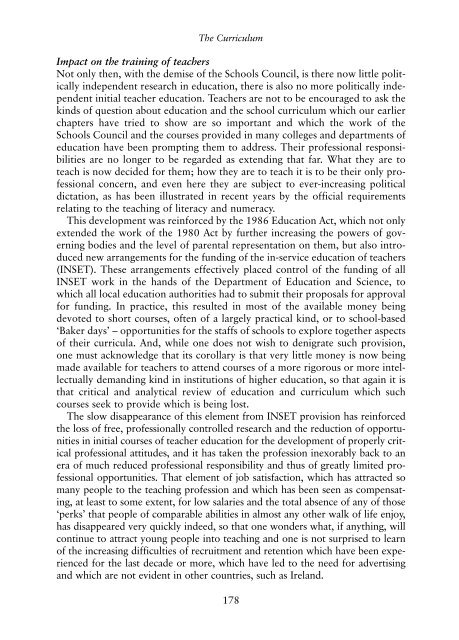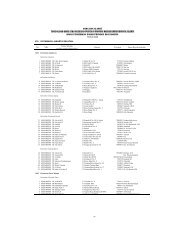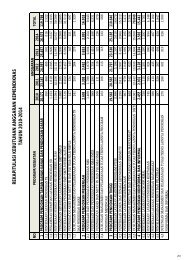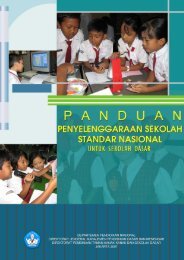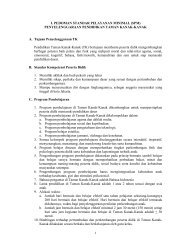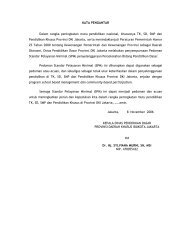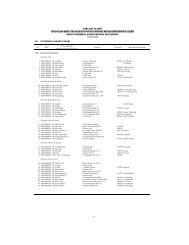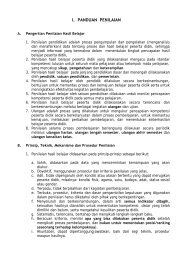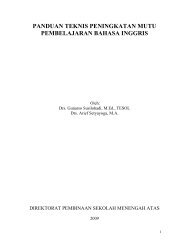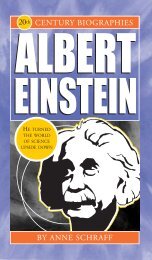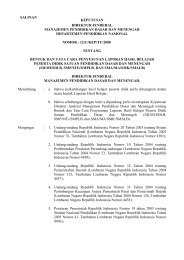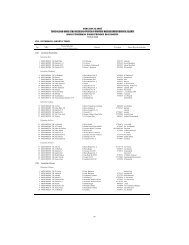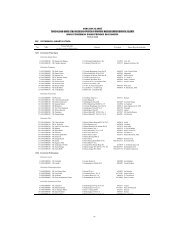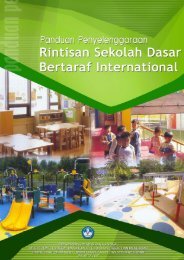The Curriculum - WordPress.com
The Curriculum - WordPress.com
The Curriculum - WordPress.com
Create successful ePaper yourself
Turn your PDF publications into a flip-book with our unique Google optimized e-Paper software.
<strong>The</strong> <strong>Curriculum</strong>Impact on the training of teachersNot only then, with the demise of the Schools Council, is there now little politicallyindependent research in education, there is also no more politically independentinitial teacher education. Teachers are not to be encouraged to ask thekinds of question about education and the school curriculum which our earlierchapters have tried to show are so important and which the work of theSchools Council and the courses provided in many colleges and departments ofeducation have been prompting them to address. <strong>The</strong>ir professional responsibilitiesare no longer to be regarded as extending that far. What they are toteach is now decided for them; how they are to teach it is to be their only professionalconcern, and even here they are subject to ever-increasing politicaldictation, as has been illustrated in recent years by the official requirementsrelating to the teaching of literacy and numeracy.This development was reinforced by the 1986 Education Act, which not onlyextended the work of the 1980 Act by further increasing the powers of governingbodies and the level of parental representation on them, but also introducednew arrangements for the funding of the in-service education of teachers(INSET). <strong>The</strong>se arrangements effectively placed control of the funding of allINSET work in the hands of the Department of Education and Science, towhich all local education authorities had to submit their proposals for approvalfor funding. In practice, this resulted in most of the available money beingdevoted to short courses, often of a largely practical kind, or to school-based‘Baker days’ – opportunities for the staffs of schools to explore together aspectsof their curricula. And, while one does not wish to denigrate such provision,one must acknowledge that its corollary is that very little money is now beingmade available for teachers to attend courses of a more rigorous or more intellectuallydemanding kind in institutions of higher education, so that again it isthat critical and analytical review of education and curriculum which suchcourses seek to provide which is being lost.<strong>The</strong> slow disappearance of this element from INSET provision has reinforcedthe loss of free, professionally controlled research and the reduction of opportunitiesin initial courses of teacher education for the development of properly criticalprofessional attitudes, and it has taken the profession inexorably back to anera of much reduced professional responsibility and thus of greatly limited professionalopportunities. That element of job satisfaction, which has attracted somany people to the teaching profession and which has been seen as <strong>com</strong>pensating,at least to some extent, for low salaries and the total absence of any of those‘perks’ that people of <strong>com</strong>parable abilities in almost any other walk of life enjoy,has disappeared very quickly indeed, so that one wonders what, if anything, willcontinue to attract young people into teaching and one is not surprised to learnof the increasing difficulties of recruitment and retention which have been experiencedfor the last decade or more, which have led to the need for advertisingand which are not evident in other countries, such as Ireland.178


